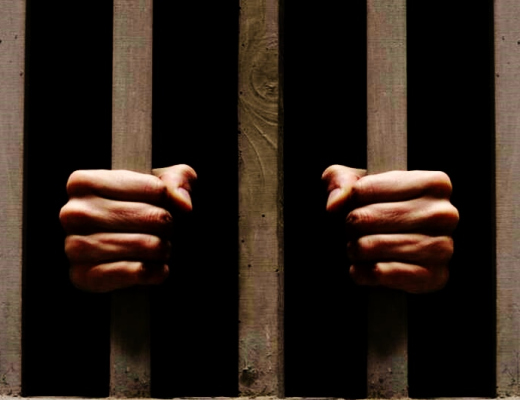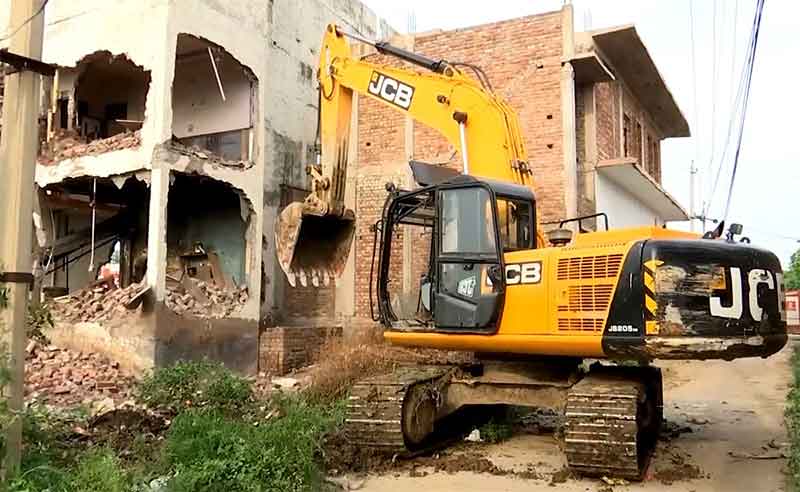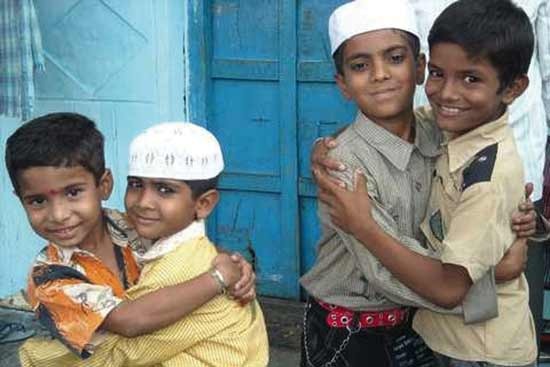
The plight of the undertrials in the jails:
The majority of the undertrials in India belong to the disadvantaged sections of the society. The offences alleged to have been committed by them may be minor ones but they are forced to languish in jails without a trial for years, as the criminal justice system in the country is a slow-moving one and the detainees have little access to legal help to be able to get early relief.
There are others who are subject to preventive detention on grounds of involvement in more serious offences such as sedition, inciting violence, acting against national security, conspiracy against the State and so on. They too are detained without a trial and they remain incarcerated for unduly long periods.
Considering that a person should be presumed innocent till he or she is proven guilty, any detention without a trial even for a day militates against the idea of a civilised democracy, as it causes not only loss of personal liberty and the consequent economic loss but also mental trauma and humiliation for the detainees and their families.As and when such detainees are found innocent through a formal judicial process, they rarely get compensated for the pain and loss suffered by them.
Undertrials who belong to the disadvantaged sections of the society:
As at the end of 2019 (National Crime Records Bureau, 2019), out of 4,78,600 inmates of the jails across the country, 3,30,487 (69%) were “undertrials”, awaiting trial. Around 74% of them belong to the SCs/STs/OBCs. Out of them, there were at least 85,646 who had already spent more than a year in overcrowded, unhygienic jails, even though they were yet to be proven guilty. Most of the undertrials cannot afford to secure legal counsel to defend their cases and, consequently, they are forced to languish in jails awaiting trial. Many of them may be acquitted in due course but rarely do courts order compensation for the prolonged loss of their personal liberty and the intense trauma they undergo, nor those undertrials who are socio- economically disadvantaged have the ability to seek any such relief, once they are found innocent. Meanwhile, their families would have suffered intense humiliation and livelihood loss and their children deprived of their right to education.
To cite an example, a young rickshaw puller in Assam and his wife were arrested in June, 2019 on a suspicion that they were “illegal foreigners” and were forced to be in detention for one and a half years. In the absence of any help, they had no other option than to withdraw their children, aged 5 years and 7 years, from the school, so that they could look after them in the jail. Though the first detainee was born in Assam and his grandparents’ names figured in the National Register of Citizens (1951) and his father was a registered voter as early as in 1965, the authorities concerned had neither the time nor the necessary inclination to ascertain those facts. In the detainee’s words, “We are both unlettered and were in no position to make sense of the documents or what we were supposed to do”. They could not afford to engage a lawyer to plead their case while in detention. Fortunately, a few human rights activist-cum-lawyers came to their help and sought the High Court’s intervention which resulted in both of them being declared as “Indian citizens”, after they had already spent one and a half years in jail. (https://indianexpress.com/article/north- east-india/assam/assam-nrc-detention-centre-7128303/). Who will compensate them for the prolonged loss of their personal liberty and for their children losing crucial 18 months of education? Those responsible for the wrongful detention in this case are yet to be held accountable.
There is a system of free legal services available at the district level but its impact on the plight of these undertrials has remained insignificant, as it cannot reach out on its own to the undertrials in need of legal advice.
Arrests made under preventive detention laws:
There are thousands of others arrested on suspicion that they have committed offences such as sedition, having links with banned extremist groups, conspiracy against the State and so on. In such cases, the slow-moving investigating agencies, often subject to extraneous political influences, take unduly long time to file charge- sheets in the courts, unmindful of the trauma and humiliation suffered by the detainees, their families and their associates, for no fault of the detainees. For those who have devoted the best part of their life for safeguarding the human rights of the disadvantaged groups and for those who have fearlessly exposed from time to time in the public interest, the shortcomings in governance, it is grossly unjust to brand them as “anti-national”.
For example, in the Bhima Koregaon case, since June 2018, 16 persons, including Stan Swamy, an activist campaigning for the tribals in Jharkhand, had been arrested and charged under several sections of the draconian Unlawful Activities Prevention Act (UAPA), an anti-terror law that abridges the fundamental, Constitutional rights of those arrested (https://thewire.in/rights/bhima-koregaon-case-trying-without-a-trial- is-the-intent-of-draconian-uapa-law). Stan Swamy died in custody on July 5, 2020 without ever being found guilty during his lifetime and without the prospect of those in authority ever addressing the genuine concerns he had raised about the legitimate rights of the tribals (https://countercurrents.org/2021/07/fr-stan-swamy-has-expired- but-his-questions-havent/). It looks as though those in authority who infringe the statutes enacted for the tribals under the Fifth Schedule to the Constitution go scot free, while those that raise concerns are harassed!
According to the information provided by the Union Home Ministry on March 9, 2021 in the Lok Sabha, during the years 2015-19, 7,050 arrests were made by the authorities in different States under the UAPA alone. Most of those arrested are still awaiting their trial. Since 2019, the Jammu and Kashmir (J&K) administration has booked over 2,300 people in more than 1,200 cases under the UAPA and also another 954 people under the Public Safety Act (PSA). Out of them, 46 per cent of those booked under the UAPA and about 30 per cent of those detained under the PSA are still in jail, both inside and outside J&K, without the prospect of an early trial. (https://indianexpress.com/article/india/2300-booked-under-uapa-in-jk-since-2019-nearly-half-still- in-jail-7438806/).
It is ironic that in the case of those held under the UAPA, the PSA and the other national security-related and preventive detention laws, for all practical purposes, they are considered guilty till they can prove their innocence beyond all reasonable doubt, a brazen reversal of the well established legal principle, accepted from time immemorial, “the burden of the proof lies upon him who affirms, not he who denies”.
One can fully appreciate the State’s concern for protecting the nation’s integrity and preempting violence. If someone has indeed incited violence and that person’s guilt has been established beyond all reasonable doubt through a formal judicial process, he or she shall have to face punishment in accordance with the relevant laws in force. In the case of the undertrials referred above, that is not the case. It is the investigating agencies that have detained the accused on suspicion and made sure that they remained in detention for a prolonged duration on the ground that the investigations were are still in progress. Further, there are also delays in the judicial proceedings for one reason or another. Whatever be the reasons, those at the receiving end are the detainees whose personal liberty is curtailed in an unjust manner. Detention without a trial is no different from detention after conviction. To blur the line between the two and routinely accept the idea of imprisonment without trial is to make a mockery of the rule of law that constitutes the foundation of our democracy.
Constituent Assembly’s deliberations on “preventive detention”:
In this context, it is instructive to recall the discussions that took place in the Constituent Assembly during September, 1949 on the provision relating to “preventive detention” in the draft Constitution.
During those discussions, the draft Article which introduced the idea of preventive detention met with severe criticism. Those that suffered detention at the hands of the British during the freedom struggle (In the words of some members: the “’dark days’ of the British empire during 1942 and thereafter”. ..“we know that the British detained persons without just cause, often on mere suspicion, or just because some officer wanted to take revenge on somebody”) expressed their vehement opposition to the very idea of detention without a trial, while a few others felt that such a provision was necessary to prevent anti-national activities.
Dr B R Ambedkar who presented the original draft appreciated these concerns and expressed his own fears in the following words.
“We do not know how the situation in this country will develop, what would be the circumstances which would face the country when the Constitution comes into operation., whether the people, and parties in this country would behave in a constitutional manner in the matter of getting hold of power, or whether they would resort to unconstitutional methods for carrying out their purposes. If all of us follow purely constitutional methods to achieve our objective, I think the situation would have been different and probably the necessity of having preventive detention might not be there at all But I think in making a law we ought to take into consideration the worst and not the best. Therefore if we follow upon that position, namely, that there may be many parties and people who may not be patient enough, if I may say so, to follow constitutional methods but are impatient in reaching their objective and for that purpose resort to unconstitutional methods.”
Looking back, Dr Ambedkar’s words seemed to resonate time and again, throughout the seven decades that have elapsed since then. Preventive detention is no longer treated as an exceptional measure. It is routinely used as a day-to-day weapon to quell opposition and dissent.
Considering that preventive detention was strictly a “necessary evil” in the “worst” case scenario, it was with utmost reluctance that the Constituent Assembly finally incorporated the idea of preventive detention in the relevant Article but imposed stringent time limits on detention without a trial. Though they proposed independent Advisory Boards comprising of the members of the higher judiciary who would exercise oversight on such detentions with a judicious mind, not influenced by the political executive, instead of incorporating such a provision explicitly, they thought it prudent to trust the future generations of legislators to have the good sense to take a positive view on it, hoping that the latter would respect the principles of natural justice and the spirit of democracy that underlies the Constitution. However, the later generations failed to live upto their expectations as evident from the developments during 1975-76 when the then Congress government declared a national emergency and brazenly abridged the citizen’s fundamental rights, merely to maintain itself in power. At that time, it was the Janata alliance in opposition that was at the receiving end of the emergency, who therefore vehemently opposed the authoritarianism and arbitrariness associated with it. Among the other things, one of the ugly weapons used during the emergency was to detain the opponents of the ruling elite without a trial. The Janata alliance which came to power soon after that, in rebound, enacted the Constitution (44th Amendment”) Act, 1978 that enabled the government to notify an upper ceiling of two months for preventive detention, subject to a close oversight by independent Advisory Boards comprising of members of the higher judiciary, which in effect implied that all detentions in excess of two months should be subject to direct or indirect judicial scrutiny. Though more than four decades have elapsed since then, the required notification of such far reaching implications is yet to be issued, which amounts to a Constitutional amendment approved by the Parliament being arbitrarily kept in abeyance. It is particularly ironic that the present NDA government at the Centre, which keeps harping on the “dark days of emergency,” should ignore a progressive Constitutional amendment enacted by their own associates in 1978 as a safeguard against emergency-like situations, thereby allowing status quo in which the political executive continues to pursue authoritarian approaches bordering on emergency. As a result, the kind of independent Advisory Boards that the 1978 law provided are yet to come into existence. Meanwhile, preventive detentions are being used more and more routinely as an instrument for gagging political dissent and intimidating the human rights activists, a prospect that Dr Ambedkar had apprehended when the idea of preventive detention was first introduced in the Constitution. In other words, there is no difference between one political party and another in terms of their urge to remain in power, even at the cost of democracy.
Selective application of the preventive detention laws:
As already stated, preventive detention is being used more and more as an instrument to choke dissent. It is used as a means to intimidate those who point out shortcomings in governance and who campaign for safeguarding the human rights of the disadvantaged. On the other hand, those who belong to the ruling political executive who spread hate and make divisive statements are let off.
For example, wee have instances of two Central Ministers (https://www.youtube.com/watch?v=6u9P1J_WopU & https://www.tribuneindia.com/news/nation/purported-video-of-mos-ajay-kumar-mishra-surfaced- on-social-media-ahead-of-lakhimpur-violence-320038) and a State Chief Minister (https://www.indiatoday.in/india/story/pick-up-sticks-and-treat-farmers-haryana-cm-s- controversial-remark-stirs-row-watch-1860292-2021-10-03) making provocative statements in the recent times, inciting the people to retaliate but the concerned authorities chose not to act.
Reparation for detention without trial:
The right to a speedy trial is as important as the right to a fair trial. To detain a person for a long period without a trial is repugnant to the idea of a civilised democracy.
While the apex court has indeed addressed some of these concerns and laid down exemplary norms to speed up trials, considering that an undue delay of even a day in the delivery of justice to an undertrial can diminish the citizen’s right to protection of personal liberty under Article 21, the apex court may also have to intervene suo motu in laying down an effective set of norms to force the investigating agencies to function more independently and efficiently, so as to minimise the scope for unjust detention. The apex court may also consider putting in place a consistent set of norms for the State to compensate the affected citizens for the inordinate delays in investigation of offences.
Coming to the concept of reparation for the delay in trial, Justice Madan Lokur in a recent speech published in Live Law ( https://www.livelaw.in/columns/uapa-compensation- and-reparation-acquitted-after-long-periods-of-incarceration-madan-lokur-180035) comprehensively dealt with the subject and emphasised the need to compensate the affected person not only for the economic losses suffered but also for the “impact of wrongful arrest and imprisonment manifesting as mental trauma in the acquitted and their families”. In addition, the socio-economic losses inflicted on the undertrials belonging to the low-income groups as a result of their children losing educational opportunities should also be recognised and compensated for.
The right to a fair and a speedy trial becomes enforceable only when the affected person has also the simultaneous right to secure compensation easily. In the case of the undertrials belonging to the disadvantaged sections of the society, it is necessary to put in place an institutional mechanism that comes into play on its own to reach out to those found innocent and ensure that the authorities fully compensate them.
Perhaps, an acquittal order in such cases should also assess the quantum of compensation and direct the authorities to grant such compensation to the acquitted person in a time-bound manner.
Need to revisit the preventive detention laws:
It is equally desirable for the apex court to revisit the laws such as the UAPA, the PSA etc. from the point of view of discouraging the State to be arbitrary in the matter of detaining its citizens and abridging their right to life under Article 21. The apex court may have to hold the relevant provisions in those laws to be inconsistent with the principles of natural justice implicit in the Constitution. In this matter, a half-way approach may not suffice.
The need for “radical” reform:
Against this background, it is instructive to recall the anguish expressed in the following words by Justice V R Krishna Iyer in his judgement on January, 31st, 1978 in Babu Singh And Ors vs The State Of U.P on 31 January, 1978.
“Our justice system, even in grave cases, suffers from slow motion syndrome which is lethal to ‘fair trial’., whatever the ultimate decision. Speedy justice is a component of social justice since the community, as a whole, is concerned in the criminal being condignly and finally punished within a reasonable [time] and the innocent being absolved from the inordinate ordeal of criminal proceedings………………………………………………………. by the way, although it is important that judicial business management by engineering, not tinkering, so as to produce efficient expedition, is [an] urgent, high-priority item on the agenda of court reform, to be radically undertaken none too soon”
As proposed by Justice Krishna Iyer, what is urgently called for is a radical approach to restore the rights of the large number of unfortunate undertrials languishing in jails without any semblance of a trial. Certainly there is urgent need to ensure that the laws and the procedures in force are fully consistent with the principles of natural justice, both written and unwritten in the Constitution. As an immediate measure, the apex court may have to question the government on its failure to notify the progressive provisions of the Constitution (44th Amendment) Act of 1978 and exercise its inherent powers to institute independent Advisory Boards that should exercise oversight on preventive detentions. Leaving this matter entirely to the political executive will only delay matters and further erode the citizen’s fundamental right under Article 21.
Speedy justice is a component of social justice and it is an important human right on which there can be no compromise.
E A S Sarma, Former Secretary to Government of India















































